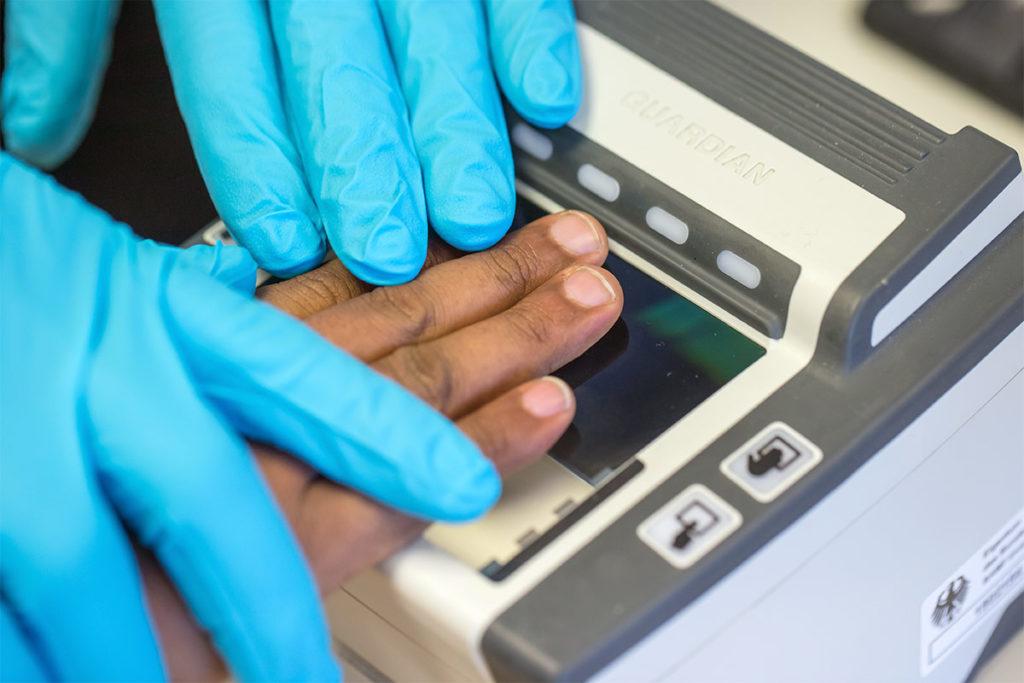Q & A: Why fingerprints will help you in the asylum procedure

There are many myths and much false information about fingerprints in the asylum application process. For that reason, we have summarised the facts on how your fingerprints will be used – and why they are important in order to get help.
One common but incorrect myth is that asylum-seekers benefit from refusing to submit their fingerprints to the public authorities in EU member states. Often this false information comes together with the fake advice that it will be possible to remove your fingerprints after they are stored in European asylum-seeker databases, which essentially means that these fingerprints can be deleted. This is supposed to help avoid official registration. But if somebody tells you a story like this, we are sorry to say that it’s based on myth rather than facts. This Q & A will help you to get the facts right:
Do I benefit when I submit my fingerprints?
Fingerprints can be your door-opener for getting help. After your official registration, which includes being fingerprinted, you are entitled to German state assistance. This includes the “Asylbewerberleistungen” or asylum-seeker’s benefits, such as basic support.
Why are my fingerprints recorded?
Each refugee arriving in Europe has to register and apply for asylum in the country that they entered the territory of the European Union for the first time. All asylum-seekers have to have their fingerprints checked and recorded. That’s the core part of the Dublin Procedure that provides the basis for asylum rules in all European countries. According to this regulation, the EU member state where you were first fingerprinted is responsible for your asylum case.

In which situations do I have to allow my fingerprints to be recorded?
There are basically three different situations where officials from European Union member states have the right to ask you for your fingerprints:
- Once your official application for asylum is handed in to the relevant authorities, recording fingerprints is mandatory for all applicants older than 6 years.
- If you are stopped crossing the EU’s external border illegally, the border guards will ask you to have your fingerprints checked and recorded.
- All individuals living in a member states of the European Union without legal permission will be asked to submit their fingerprints once they are in contact with local authorities.
Can I refuse to have my fingerprints recorded?
No, because all persons in one of the three situations mentioned above have the legal obligation to comply and have their fingerprints recorded.
What happens if I refuse to cooperate?
As recording your fingerprints is obligatory in the above-mentioned situations, the authorities will be able to enforce this identification process with appropriate legal means.
How long will my data be stored?
Once you transmit your official asylum application, your fingerprints will be stored for a maximum of 10 years in a centralised database named EURODAC. If your asylum application is successful, and if you are later granted citizenship in a separate application process, your data will be deleted from the asylum application database. Otherwise, your data will be stored in this centralised database for a maximum of 18 months or, in specific situations, not at all.
Will the German authorities know if your fingerprints have been recorded in another EU country such as Greece?
Yes, of course, but only in line with strict rules and regulations. European Union member states cooperate closely in the asylum application process. This includes the centralised storage of all fingerprints from asylum-seekers in a database named EURODAC. With this digital tool, fingerprints taken in Greece can be compared with fingerprints taken in Germany and vice versa. However, the German authorities will only make use of this right to check fingerprints in line with clearly defined rules. This includes: when an asylum-seeker files an application in Germany, the authorities are notified if this person has already applied for asylum in Greece. In this case, the asylum application process has to stop in order to clarify which country is responsible. Moreover, if somebody caught entering the European Union illegally applies for asylum in Germany, the German authorities will be notified via this digital database system.

Can fingerprints be deleted or removed?
Fingerprints can only be actively deleted from the specific central database once it is proven that they are incorrect or once it becomes clear that they have been stored illegitimately. If you intentionally manipulate your fingerprints or try to remove them, your asylum procedure can be stopped by the authorities.
